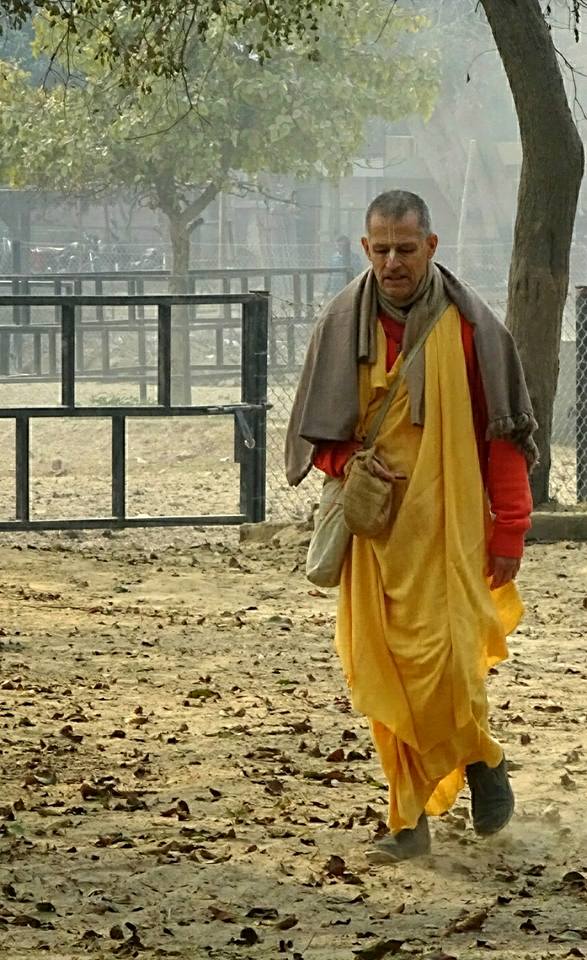Divine Serendipity
Serendipity—definition: The faculty of making happy and unexpected discoveries by accident. Also, the fact or an instance of such a discovery.
Here are two true stories of serendipity that I have heard in recent days (while in Argentina and Uruguay).
Bhakta Omar, a retired teacher and tax office manager, is an enthusiastic participant in programs with devotees in Montevideo. As we sat in the back garden of Krishna Candra Prabhu and Melissa in Punta del Este, he told me how he met devotees: More than 15 years ago he received a copy of Bhagavad-gita Tal Como Es (Bg-As It Is) from a devotee. He read some of it, then after some time a friend borrowed it from him and never returned it. Fifteen-plus years later, he remembered the Gita and felt a strong desire to read it again, this time more carefully. Asking in a bookstore if they had a Bhagavad-gita, they directed him to their branch shop, down the street—maybe they would have one. As Omar was heading for the second shop, just then a group of devotees—brahmacaris—came by, singing in kirtan the mahāmantra. Omar happily thought, “They must have what I am looking for, the Bhagavad-gita!” He watched and listened as the devotees passed by him, then approached the brahmacari at the very back of the group (Phanendra Gaura Das) and asked him. Sure enough, he had a copy of the Gita! Omar explained to him about his search for the Gita, and Phanendra told Omar, “Krishna is accustomed to making such arrangements.”
A bit of background: The group of devotees doing harināma saṁkīrtan were from Argentina, staying in Montevideo for the 2015 Prabhupada marathon. They (all 15 of them) were staying with Rasamrita Sesa Das, who volunteered to host them. Otherwise, it was not at all a regular thing that harināma was going on in Montevideo…
My godbrother Mahatma Prabhu, from USA, tells a story (in his seminar on Forgiveness, which I HIGHLY recommend —

available here [I think the story is in Part 5, but not sure) that he was told by a lady from India: She had just gotten a new job in an NGO in Sudan and was working for about two weeks. But she felt miserable. Seeing all the terrible poverty and disease and political unrest in the country, she decided it was too much for her. On her way to work, as she was planning to go to her boss to inform that she was resigning, she was walking along the street with her head covered with a hat to protect from the hot sun. She was also looking down on the ground close to her as she walked, and suddenly she noticed something: There on the ground was a matchbox with an interesting picture on its cover. She picked it up and looked more closely: It was a picture of Krishna. She stopped abruptly and thought. “Could it be that Krishna is trying to tell me something? Could it be that in this way He is telling me that I should stay here and continue the job, and face all the harsh realities of this country? Yes, it must be so!” In this way, she understood that “Krishna is always just one thought away from us,” and if we remember Krishna, or if He reminds us of Himself in some way, we can take courage and continue on with life and service enthusiastically. The lady decided to remain in Sudan, continuing her job for the next two years (in which she was involved in distributing life-saving medicine to over one million people).
Let us all become more sensitized to the presence of Krishna in our lives, and let us allow Him to surprise us.
Miscellaneous News from the Field
I’m starting to write a paper (an essay) that I will be presenting this summer in Oxford at the Oxford Centre for Animal Ethics annual Summer School (where I have also given presentations in the previous two OCAE Summer School events. I am, since last year, a Fellow of this Centre [as well as, since about 10 years, a Fellow of the Oxford Centre for Hindu Studies). The theme of this year’s event will be “The Ethics of Eating Animals.” Here is a link to the announcement of the event:
http://us6.campaign-archive2.com/?u=e8078cc8a96065221b73d9ab6&id=eb548c29b3&e=40a42be752
The website of the OCAE is: http://www.oxfordanimalethics.com/home/
The title of my presentation will be:
“From Devouring to Respecting: A Vaishnava-Hindu Therapeutic Perspective on Human Culinary Choice”
… and here is the paper Abstract (I will be writing the paper during the next weeks):
One important characteristic of the human species is our apparent far greater capability than most non-human animals to intentionally select the food substances we consume, rejecting other substances. But several factors may limit and otherwise determine the culinary choices we make, not least of which are habitat, history, social identity, and (individual and collective) habit. In this paper I will examine these considerations from a Vaishnava-Hindu perspective, drawing mainly on the classical texts Bhagavad-gītā and Bhāgavata Purāṇa, to reframe traditional Hindu discourse in a contemporary, “therapeutic” register. This involves an eightfold holistic typology of therapeutic components suggested by Gregory P Fields in his book Religious Therapeutics: Body and Health in Yoga, Ayurveda, and Tantra, namely, 1) metaphysical & epistemological foundations; 2) soteriology; 3) value theory and ethics; 4) physical practice; 5) cultivation of consciousness; 6) medicine and health care; 7) aesthetics; and 8) community. If the eating of animals is seen as resembling addiction, Vaishnava texts suggest that the habit can, and indeed must, be kicked. Identifying a process for breaking the habit would need to begin with recognizing and addressing the root obstacles (especially “justifications”) to making wise choices in eating, and then undertaking appropriate therapeutic measures to replace the self-destructive eating behavior with (spiritually) healthy eating behavior.